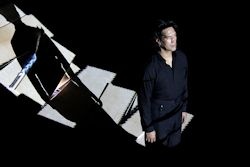Tuakana PURE
Q Theatre, Rangatira, Auckland
09/10/2013 - 09/10/2013
Production Details
“From the darkness comes a cold wind to crush the body, prophetic shadows transform the discontinued, an unspoken community. Unearth the Tūāhu, ritual space of the unknown. Awaken body, alone, unknown and nameless, dance of anonymity. Tectonic memories petrify longing, dreams are whispered, my journey from compression to gravity’s embrace, a solemn ascension. Skeletal precipice, bone cemetery, ‘Pure’ rite, dance incantation, a cleansing utterance…………”
In the Maori language, pure is a ritual and action which consists of “loosening” from dangerous elements and “binding” to beneficent ones.
Pure unfolds in a penumbra of mystery, an intercultural performance drawn from the ritual activity of the Tohunga. The ritual body, enveloped by the mythic, images of alienation narrate ancestral tales of cultural upheaval and reluctant anonymity. The choreography of Charles Koroneho becomes a Tūāhu offering, in a theatre of transgression, in a perpetual cycle of transformation. Timeless.
A protean artist, Charles Koroneho is a founding member of Te Kanikani o te Rangatahi, graduate of the New Zealand School of Dance and Elam School of Fine Arts. He shares his vision of dance with IndependANCE, is an associate artist with Lemi Ponifasio MAU and has worked in collaboration with Min Tanaka and Guillermo Gomez-Pena.
Whether political, surrealist or invested with biting irony,Koroneho’s work, such as his satirical Cultistic Misfit, is an eloquent assertion of Maori culture. His performance practice has given rise to diverse projects over the past 25 years, including his current TŪĀHU Choreographic Research (2013-14), a platform for the creation of a new philosophical space for indigenous dance.
PURE
Papa
urupa – ataamira – tūāhu
Whakatinana – Manifestation
burial – awakening – breath
Ataata – Shadowland
alienation – the unknown – anonymity
Meremere Tu Ahiahi – The Venus
transit – discipline – transgression
Tikiwananga
utterance – cycle – remembrance
Te Waka o Tamarereti
lore – constellation – incantation
Pure
bind – loosen – cleanse
Dedicated to my parents, who gave my siblings and I the most loving and supportive journey through life.
PURE Post Show Forum
Proposing a new philosophical space for Dance
Charles Koroneho and guest speakers explore cultural collaboration, intercultural performance and the intersection between dance, theatre and performance art with reference to the collaborative processes behind PURE.
Partners
Patti Shaughnessy – O’Kaadenigan Wiingashk Collective
Bill Kimball – Public Energy Artistic Producer
Marrie Mumford – Indigenous Performance Initiatives
Presenters
Public Energy, Peterborough, ON Canada
Tempo Dance Festival, Auckland New Zealand
MAI (Montréal, arts interculturels), Montreal, QC Canada
Performer: Charles Koroneho
Lighting: Brad Gledhill
1 hour plus post-show forum
Tuakana PURE, Fresh and Fault Lines at TEMPO
Review by Raewyn Whyte 12th Oct 2013
The capacity of dance to offer insight into our lives was foregrounded in the first 48 hours of Tempo 2013, with works exploring love, grief, lynching, the transformation of traditional cultural forms, the satisfactions to be found in distraction, the delights of body percussion, and human resilience.
Opening night brought a richly immersive experience in Tuakana Pure, a spectacular performance installation collaboratively created by Charles Koroneho (performer, designer, producer) in partnership with Brad Gledhill (performance design, lighting, production) and Alejandro Ronceria (dramaturgy, choreography, direction).
At once mourning the recent passing of Koroneho’s father, re-committing to aspects of family, whanau, place and culture, and reflecting on the transformation wrought by relocation, this work offers a ritualised space in which those watching are also invited to reflection.
Read review (also comments on Fresh and Fault Lines)
Copyright © in the review belongs to the reviewer
Tuakana: Pure
Review by Dr Linda Ashley 10th Oct 2013
As the audience pre-show babble echoes around, has the show started? A figure is suspended, cradled in a dwelling, frozen in the gloom. Water flows in front transforming the proscenium frame into a liquid, liminal boundary. As a community we are invited in and yet strangely alienated by a loud, discordant ringing. We talk over it. The volume increases and eventually crushes conversations, the light lowers and Pure becomes the question on our minds, as Charles Koroneho prolongs the suspended animation before embarking on the first steps of the journey – the balancing act, the Tūāhu ritual trials, awakenings and tribulations.
Charles Koroneho’s one hour solo work, in his own words, occupies the theatre space. Sustained, contemplative and achingly slow, minimal ritual movement, a certain inertness of pedestrian walking with long pauses, strips back dance to its minimal bones – oddly 1970s and yet still very 21st century. His wanderings have gravitas taking us to dark places where we become who and where we are. Evocative of a larger community, hauntingly, almost intangibly, indigenously Maori, the breath, speech, chants, tilting torso are, however, also intensely personal. Koroneho dances his identity, stories and his dance history. His reflective narrative of grieving for lost loved ones and alienation in a strange land is literally bound around a walking stick.
Copyright © in the review belongs to the reviewer
Comments
Make a comment
You must be logged in to post a comment.
Make a comment
You must be logged in to post a comment.
Ritual, remembrance, intersection and letting go
Review by Jack Gray 10th Oct 2013
The first activation of this year’s Tempo Dance Festival at Auckland’s Q Theatre is a homecoming for one of our most prodigal sons, the elusive, loved and somewhat undecorated master of the avante garde genre – Mr Charles Koroneho.
Copyright © in the review belongs to the reviewer
Comments
Make a comment
You must be logged in to post a comment.
Make a comment
You must be logged in to post a comment.





Comments